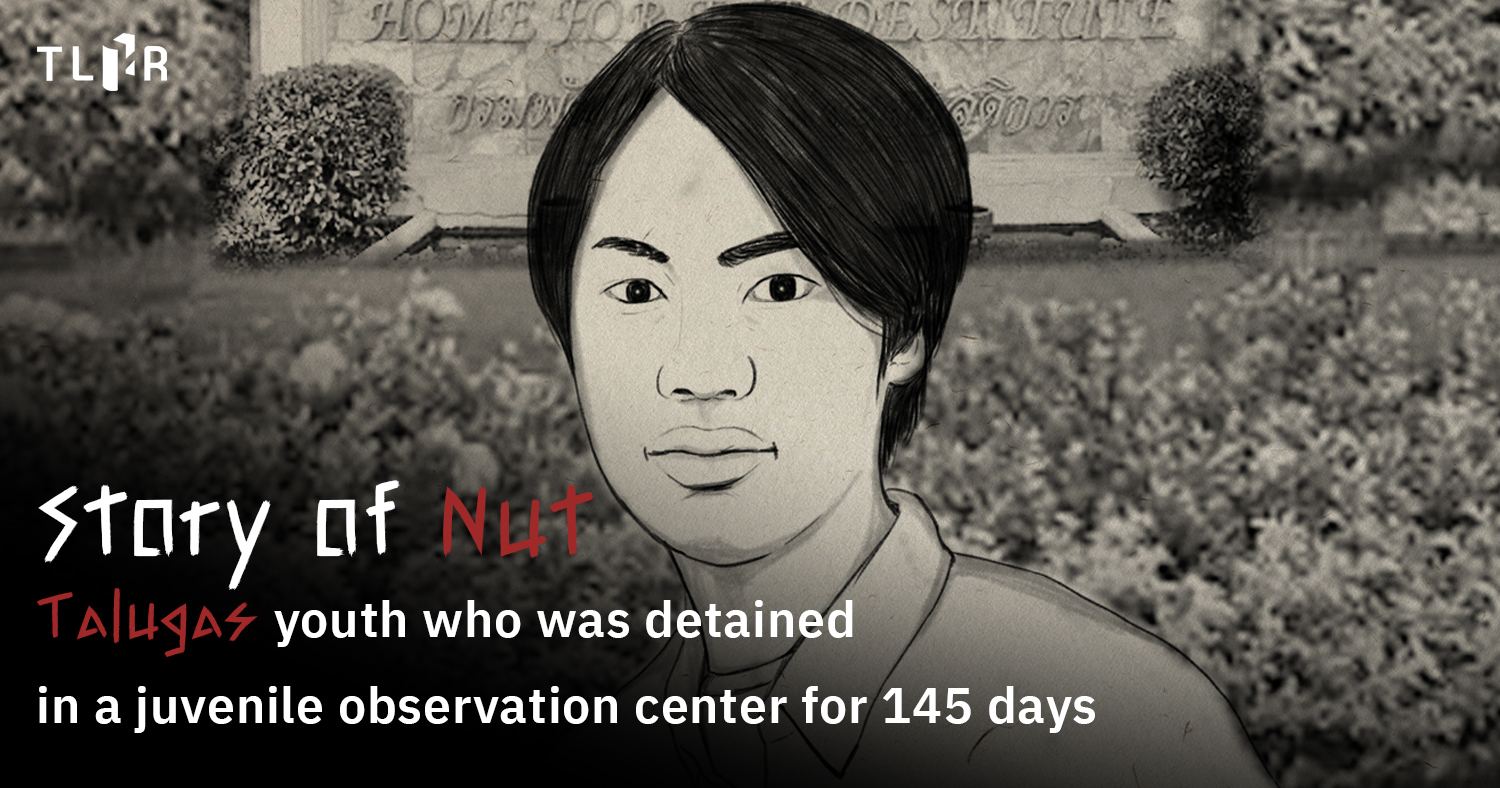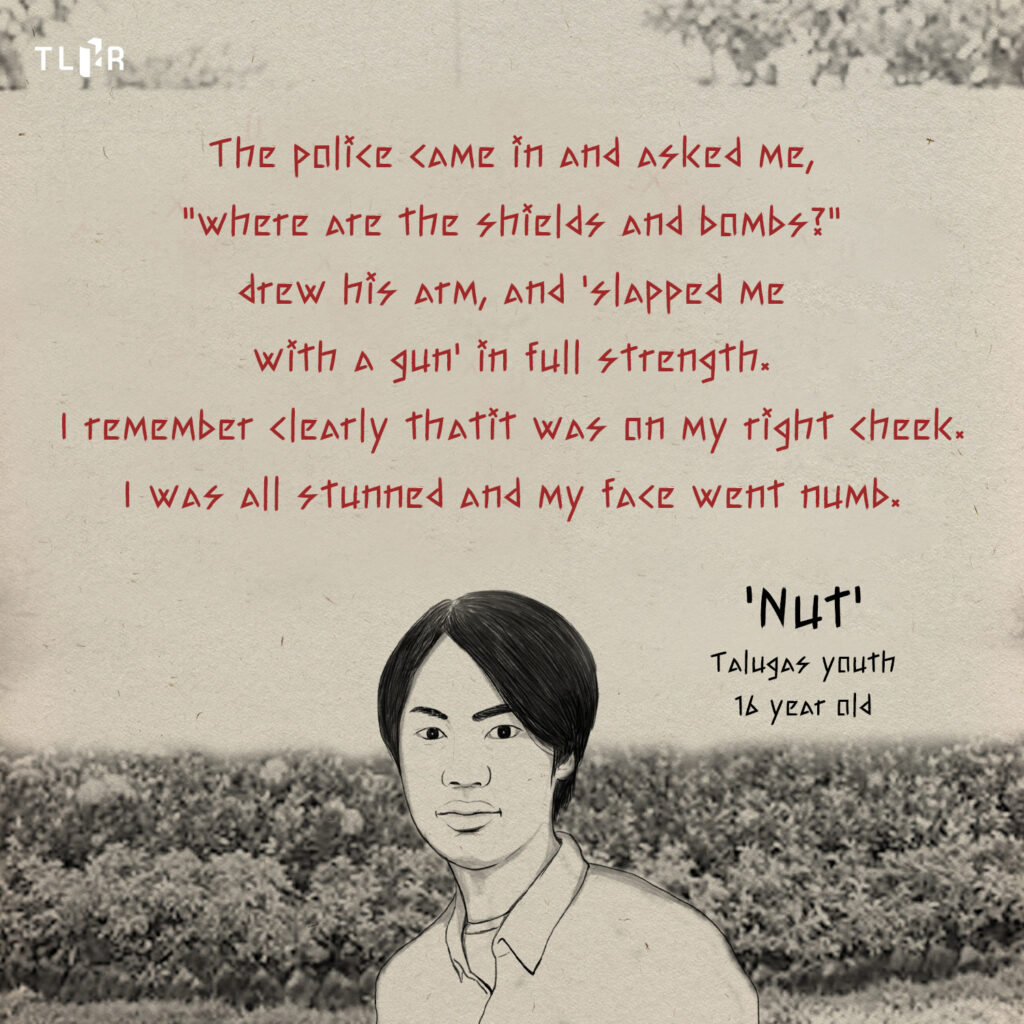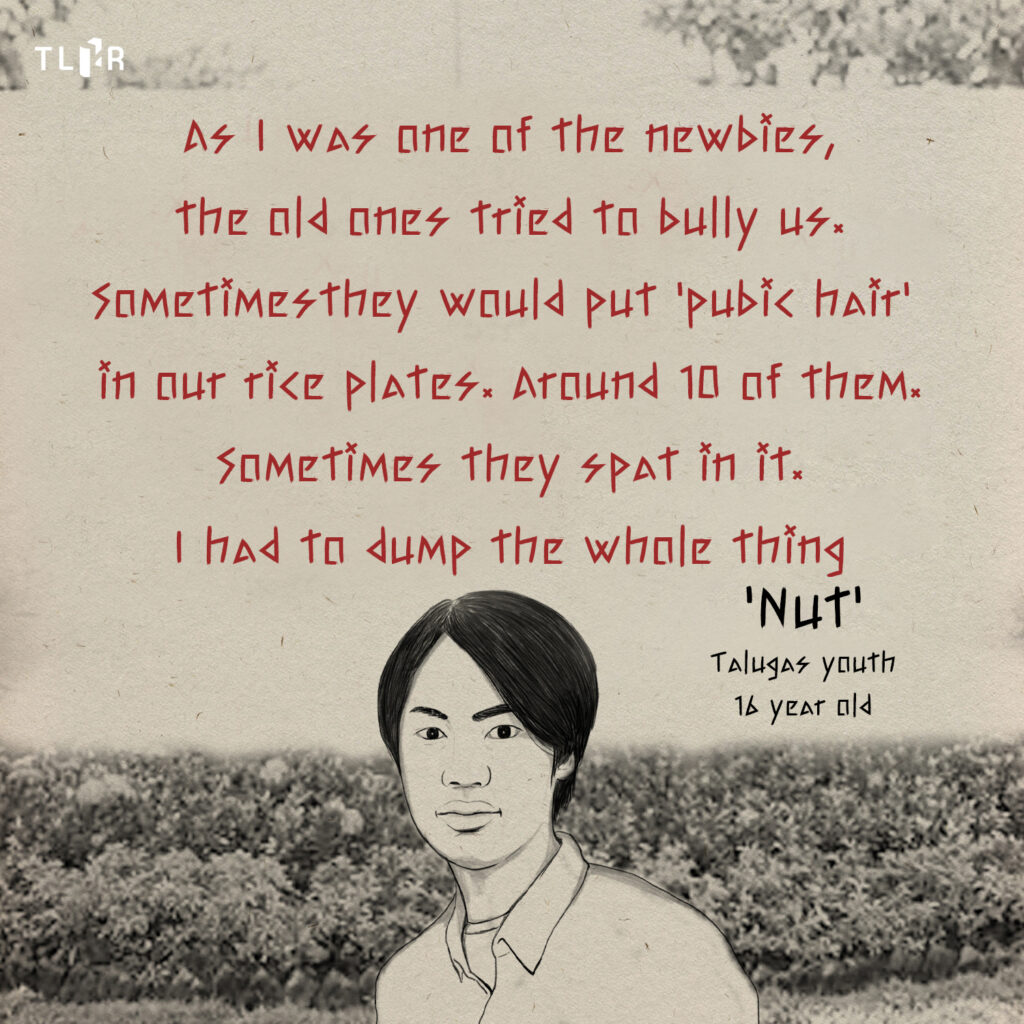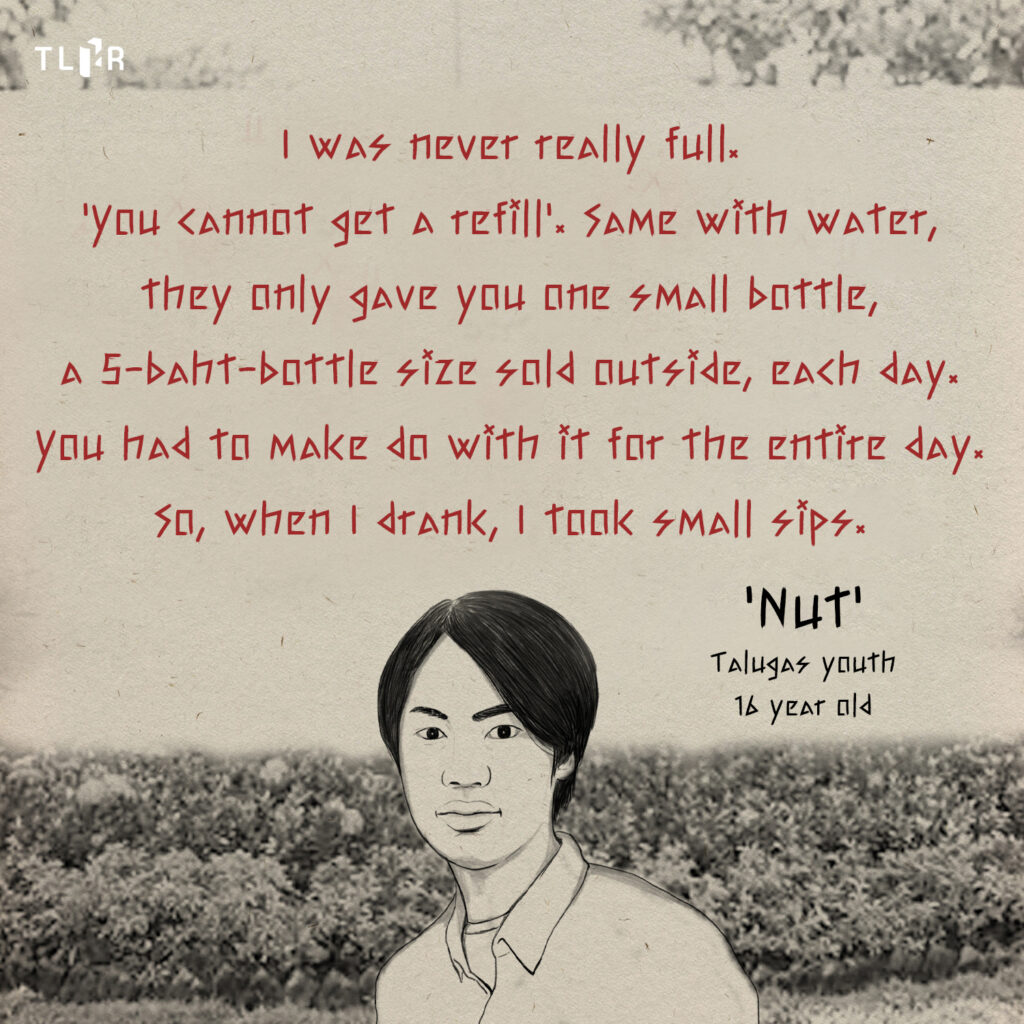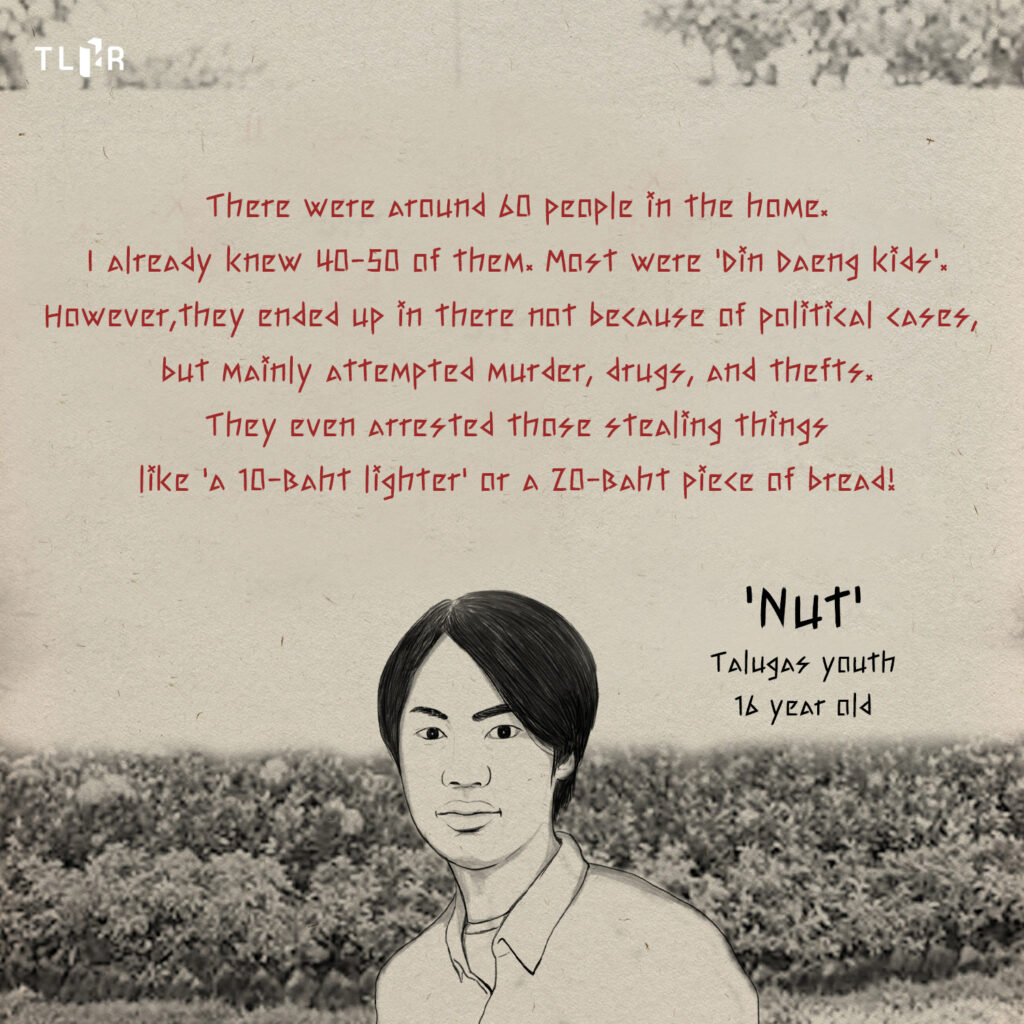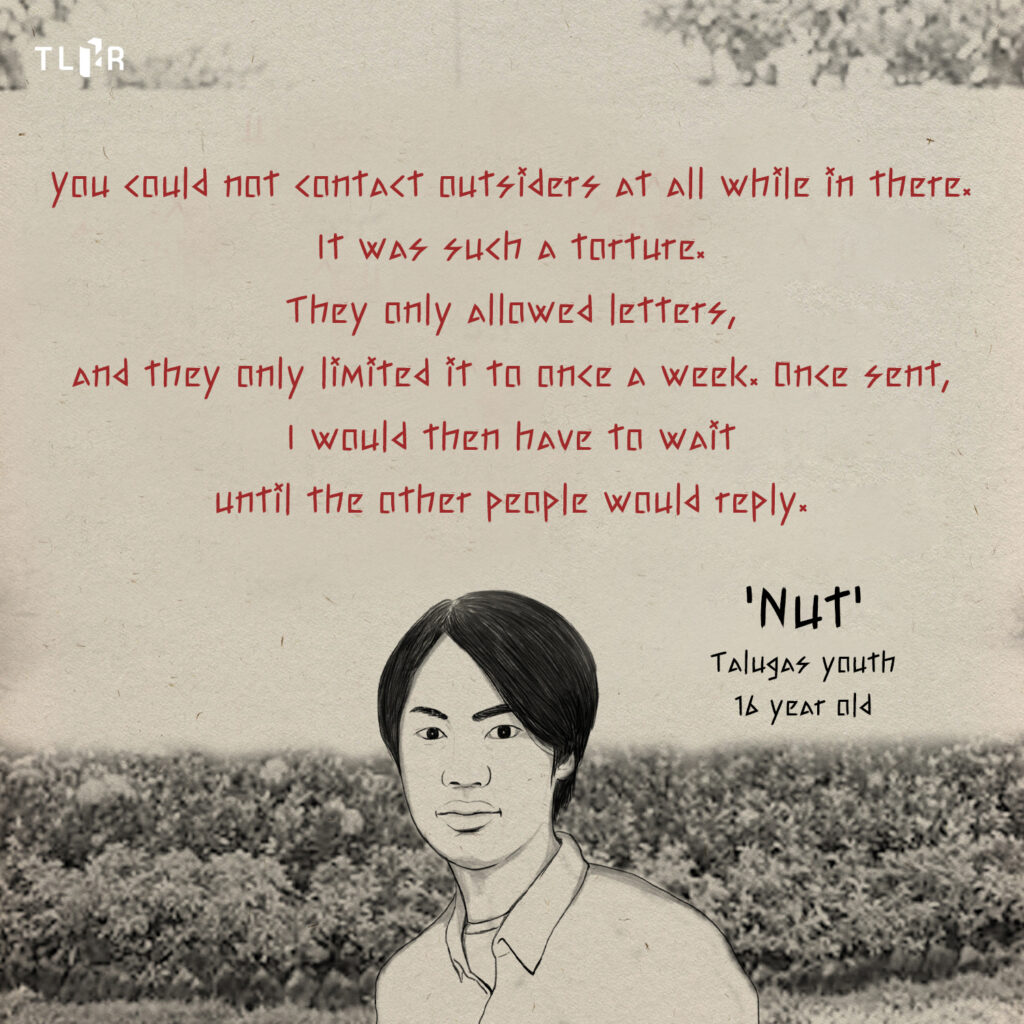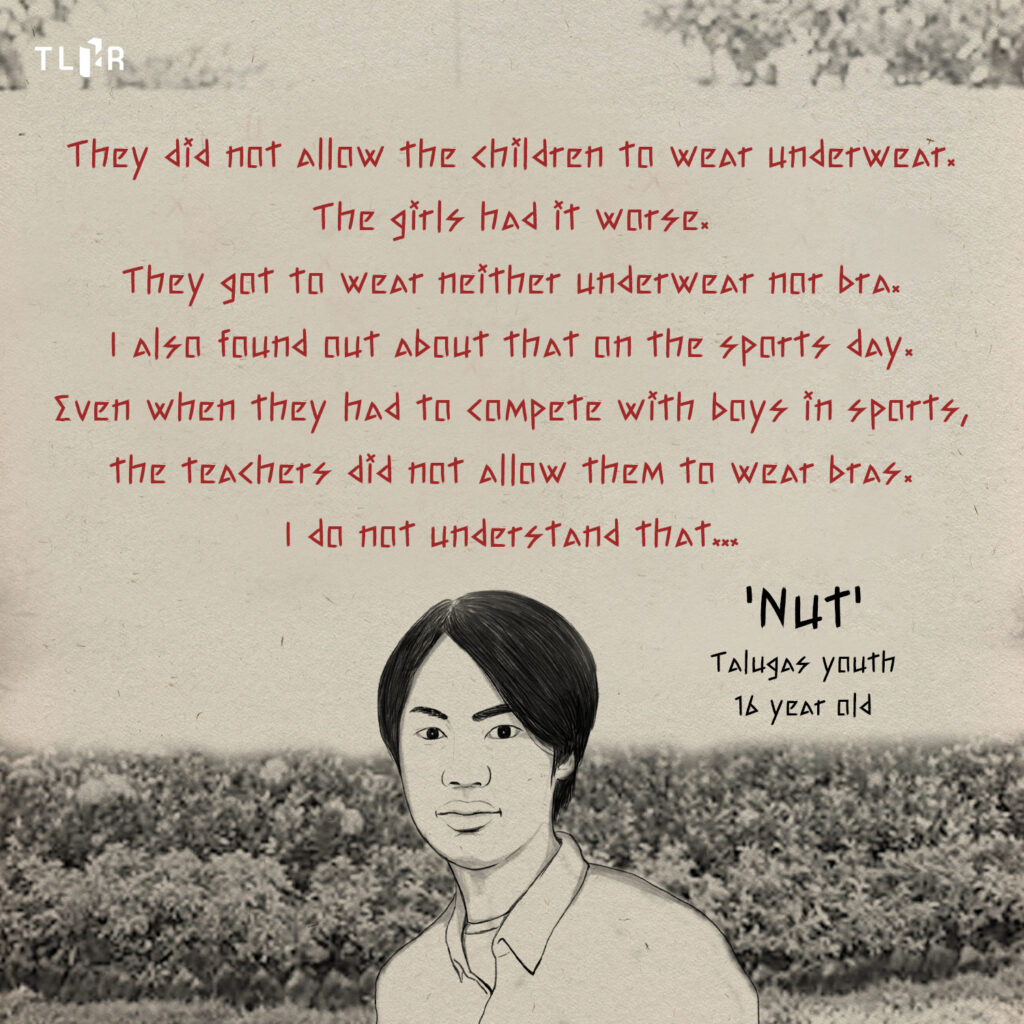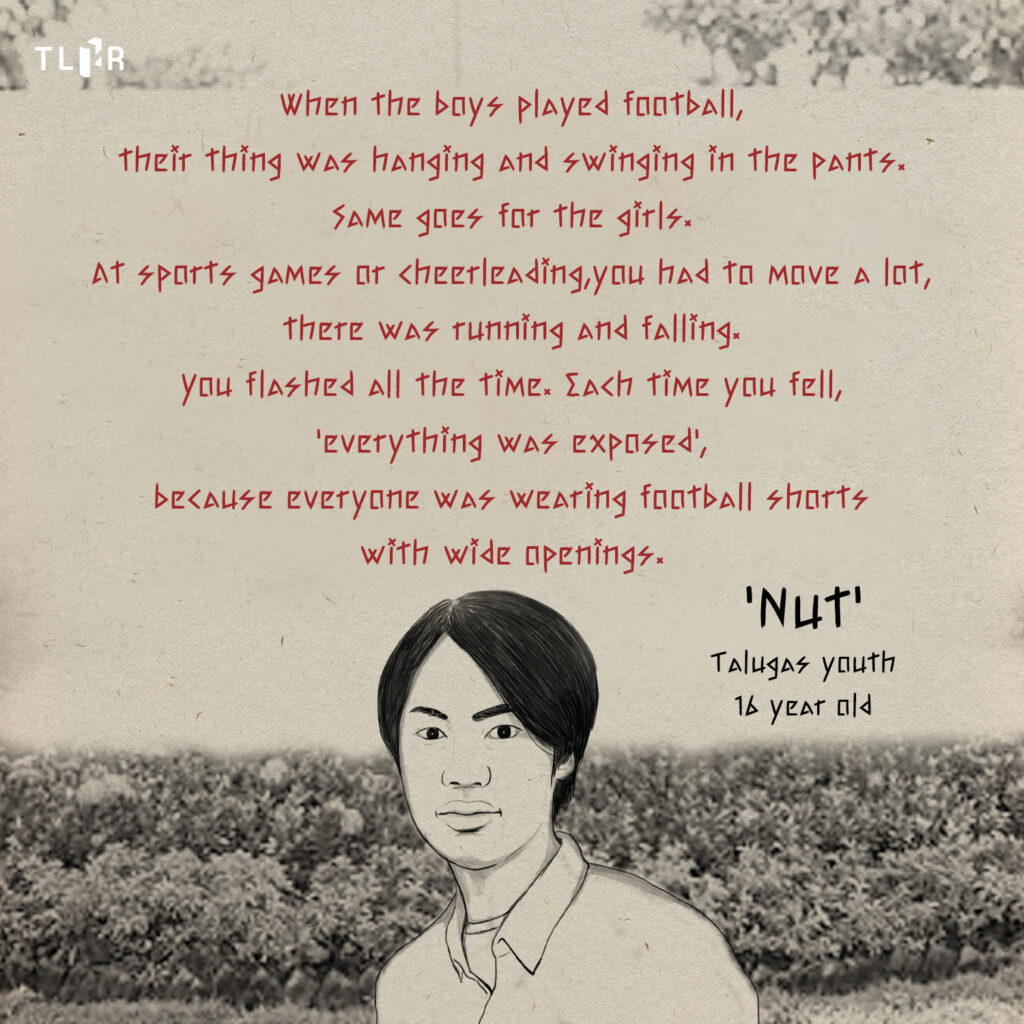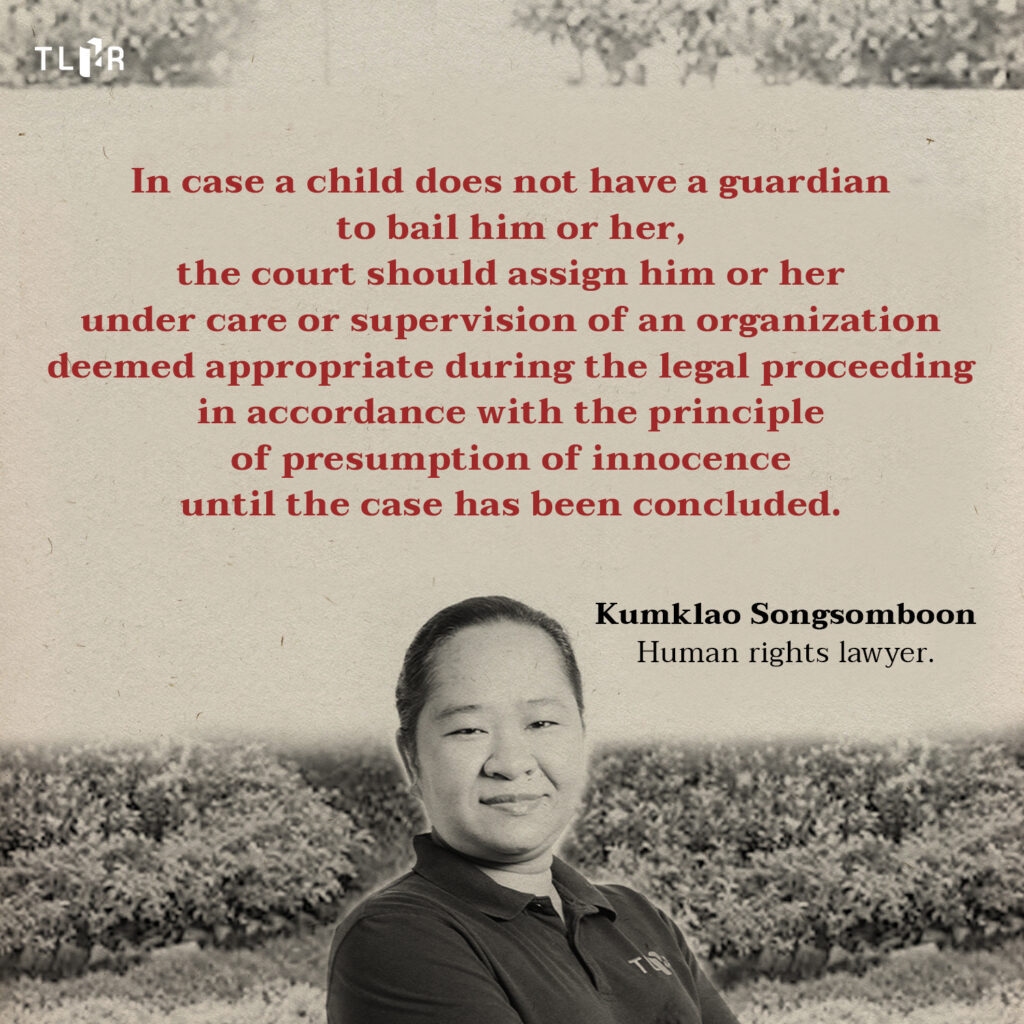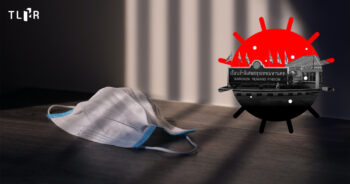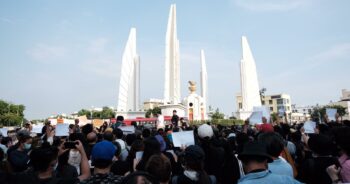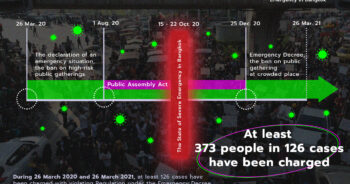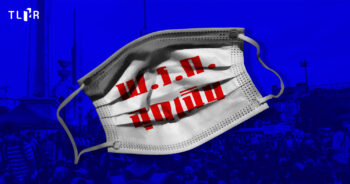Nut (alias), 16 years old, is one of the “Talugas” youth, an independent group of citizens that occupied the “Din Daeng Triangle” as their protest site between August and September 2021. Later, the boy was arrested by the police at a construction camp in Din Daeng while he was sleeping. The police tried to press him to reveal where weapons were kept by “slapping him with a gun in the face”.
Nut was accused of setting fire to a total of eight police booths and traffic light booths in various locations in Bangkok in the early morning of 23 September 2021 and was prosecuted separately in eight cases. The Juvenile Court rejected his bail request because no guardian was able to come to verify the bail on that day. Nut was thus sent to Ban Metta Remand Home for Children and Youth.
During the time Nut spent at Ban Metta Remand Home, the lawyer was attempting her best to contact his parents and other relatives, but in vain. Almost five months later, the lawyer submitted a bail request for the first time, with Nut’s ‘former employer’ accepting to be a guarantor taking Nut under his care.
In the end, on 14 February 2021, the Juvenile Court issued an order approving a temporary release for Nut from Ban Metta Remand Home and returning him his freedom. Nut has become the case in the political movement in the past two years with the longest detention time, 145 days, simply because “no guardian came to verify the bail”.
Police slapped him in the face with a gun handle and pressed him to reveal the hiding place for explosives and weapons
Rewind to 24 September 2021, Nut was apprehended along with 13 others at a construction camp in Din Daeng. The boy reminisced for a while and recounted:
“My friends and I were sleeping in the construction camp. All of a sudden, another friend who was doing laundry in front of the house started yelling, “the police are here!”. Then, dozens of police gradually entered and arrested all of my friends. Two policemen kicked open the door of the shelter I was sleeping in. I startled, yet still felt a little dizzy”.
“The police came in and asked me, “where are the shields and bombs?”. I replied, “I don’t have any”. They continued to press me. After a while, he got angry and drew his arm trying to slap me with a gun, so I told him they were behind the tree at the back of the house. So, he went to search. Unable to find, he came back, drew his arm, and ‘slapped me with a gun’ in full strength. I remember clearly that it was on my right cheek. I was all stunned and my face went numb.”
“He pressed me further, “Where are they? Are you lying? Be serious”.
On that morning, Nut and 13 others were arrested at that construction camp and brought to the Narcotics Suppression Bureau (NSB). Twelve were later released and allowed to return home.
In the end, the police only decided to accuse two people: Nut and Pot (alias). That night, after the police had pressed charges against them and conducted an inquiry, they told the two, “If you want bail, there must be a relative. If not, we will send you to an observation center.”
Pot managed to contact a relative to bail him out that night. However, no one came for Nut, no matter how much or how many times he begged. The boy spent the night at the cell at Bang Sue Police Station. The next morning, the police conducted a second round of inquiry with him, before sending him to Ban Metta Remand Home for Boys.
14-day quarantine: rice mixed with spits and pubic hair, and a small bottle of water a day
When “children and youth” become a defendant in a criminal proceeding, they are required to have a “guardian” to act as a guarantor in order to be released temporarily. On the other hand, adults (18 years old and above) can rely on anyone. As a result, Nut was sent to Ban Metta Remand Home on 25 September 2021.
“I went in on the first day with absolutely nothing. They even asked me to remove all of my clothes and change into the clothes they provided. There were two blue polo shirts for the daytime and one white singlet for the nighttime and two pants, which were football shorts. ‘No underwear was provided’ because it was not allowed at all times in there.”
“They also gave you a towel, a toothbrush, and half a bar of soap every month. They did not provide shampoo. Instead, they would squeeze it onto your head right before shower in the morning and evening. Same goes for toothpaste.”
After getting changed and receiving amenities and clothes, Nut did not join the other children at Ban Metta right away. He was isolated to monitor for Covid-19 for 14 days at a quarantine facility within Ban Metta first, together with “Bang”, another kid who was received at the same time but in a different case.
“The quarantine room was very spacious, probably would fit almost a hundred people. The windows were barred. Right behind them were another layer to high walls. So, not much wind came into the room, making the air quite warm.”
“There were toilets in the room, separated by low partition blocks of around waist height, no door. When we took a shower or passed a stool or urine, everyone could see. There were also CCTV cameras in the room because they were afraid that children would fight. There was no privacy at all. Everyone could see whatever we were doing.”
“There was nothing to do in the first week. All I did was staring at the wall and walking around the room.”
As for food, Nut told us that at every meal someone would place a plate of rice outside of the room door, three times a day. Breakfast was usually the same, either steamed or boiled rice served with a boiled egg and a small box of milk. Nut said that lunches and dinners varied and changed each day.
“Talking about the taste, sometimes I could not eat at all. ‘The taste sucked so bad’. On some days, the food was either too salty or too bland. The noodles were the worst, super sour!”
“You can forget about pork. There was none of it. We got pork maybe once a month, mostly it was ‘chicken soul’, carcass and bones. On some days, we only got rice mixed with vegetables. So, I chose not to eat at all.”
“The best dish there was ‘stir-fried pork with basil topped with fried egg’. But it was rare and only served once a month.”
“The most common dish, which was served almost everyday, was ‘fried rice with a boiled egg. It was simply rice mixed with some sauce and chicken leftover, no egg, no vegetables, whatsoever.”
“What’s shittier was that as I was one of the newbies, the old ones tried to bully us. We could expect surprises everyday. Sometimes they would put ‘pubic hair’ in our rice plates. Around 10 of them. Sometimes they spat in it. It was vivid green and clumpy. No matter whether the food tasted good or not that day, I could not bring myself to eat it at all. I had to dump the whole thing. Talking about it makes me want to puke…”
“I was never really full. ‘You cannot get a refill’. Same with water, they only gave you one small bottle, a 5-baht-bottle size sold outside, each day. You had to make do with it for the entire day. We had no right to ask for more. I have tried and asked them, but they refused. So, when I drank, I took small sips. On some days, I did not drink at all, but kept it for the nighttime when I got thirstier.”
“In the first month, I could hardly stand living there. It was freezing at night. They ordered that all windows not be closed but remain opened at all times because they wanted to listen to what we were doing. Lights were kept on as well. All of them. Until morning. I do not know why either.”
“I could not sleep in the first month. I could not fall asleep because there was too much light. So, I had to take naps during the day. However, the days were very hot. I always needed to use the fan. If not, it was impossible to be there. It was as if I was burning in hell (laugh).”
“Especially when there was a blackout because the old guys pulled the cut out, it was so hot that my friends and I could not even do anything. We could not even protest. We had no choice but to put up with it. We solved the problem by taking a bath every five minutes throughout the 14-day quarantine. I almost went mad!”, he said while holding his hands over the temples.
More than half of Ban Metta kids were Din Daeng friends charged with various offences from “stealing a 10-baht lighter” to “attempted murder”
After 14 days of quarantine, Nut joined the other children and made up with those thought to be the ones who had bullied him throughout the quarantine at Soi 21. He also found out that almost all children there were friends, friends of friends, and acquaintances. His stay there suddenly did not seem to be as frustrating and uncomfortable as anticipated.
“There were around 60 people in the home. I already knew 40-50 of them. Most were ‘Din Daeng kids’, fellow vocational college alumni and friends of friends. However, they ended up in there not because of political cases, but mainly attempted murder, drugs, and thefts…”
“They did it because some of them really had no money. They did not know what to do, so they ‘sold drugs’. Another group was involved in ‘theft’. They stole other people’s stuff. They even arrested those stealing things like ‘a 10-Baht lighter’ or a 20-Baht piece of bread!”
“Some people have a family. However, they did not come to bail them because they wanted to correct their behavior. Like in my case, probably…”
We cut him short before we hit the nail further in his head. We then asked how he slept and whether he still had to bear with the bright lights as in the quarantine days. Nut explained, “Ban Metta is divided into two sleeping quarters: one for smaller children between 14-16 years old and one for older children of more than 17 years old”.
“I stayed in the older children building, that is Building 3 [Building 1 does not exist]. It was a common sleeping area with built-in toilets. Everything was the same as the quarantine room. Sleeping mattresses were laid two tiles apart. Clothes and everything had number sewn on them. Mine was ‘3/5’, meaning Building 3 Number 5.”
“When we moved and joined everyone down here, the food situation improved. If I was not full, I could walk to get a refill. However, the taste was worse because the former cook died from Covid-19. So, there was a new one.”
“As for drinks, we had to refill the bottle from a station by ourselves. They provided us with a bottle each. You could refill it anytime. They gave us half a bar of soap each month. If we use it up, we would have nothing else to use. Some people got theirs stolen too. Come the bath time, everyone did it in a common bathroom at the same time. There was a big tub in the middle. Everyone was standing around it using a bowl to bathe themselves. The teacher gave 10 minutes for each bathing session. When the time was up, the teacher would blow the whistle for us to stop.”
Ban Metta was like a good old boarding school, so to speak. There was a football field, a futsal court, basketball court, barber, many buildings, and dormitories. The only differences from a usual boarding school were that instead of fences it was much higher walls, and there was stricter security.
Other things that make this place feel similar to a school were that there were teachers, classes, and various vocational trainings, such as soldering, hairdressing, arts, etc.
“I attended two subjects. One was computer. They taught us how to edit pictures with Photoshop. The other one I chose was ‘soldering’ because I already knew how to do it. I had even worked for a furniture shop before.”
“On the days with no classes, we were free. Mostly, we would play football or form a circle to talk about ourselves.”
Each day of Nut and friends went by without much difficulties. They were kind to each other and were friends. They lived like a family, according to Nut. He stressed that there were hardly any fights or serious bullies during his time at the home. There were some usual pranks boys pulled on each other though. All of this was single-handedly thanks to the ‘steward’, who took charge of the children at Ban Metta with a certain level of discipline.
“In there, no one cried or got sad. It was like they got to be with friends and had fun.”
“There was one guy. Right after he came in, he thought of killing himself. He probably could not deal his emotions or was afraid of bullies by older kids. I told him that no one would do such crazy things here. He got stressed before anyone had actually done anything to him.”
“He took a cable hanging from the TV to the sleeping room, then tied it to the bars at the window. Then, he would tie it around his neck and let himself hang into a squat position. I mean It was low enough to reach it standing.”
“The first time he did it, I was very shocked. I rushed to help him and carried him away. But he did it again, and again, every day. 7-8 times a day. It continued for almost a week. I told him off “if you want to die, do it, shithead. I’m fed up with you already”. In the end, he stopped.”
A mass Covid-19 infection and a 3-month quarantine
After having spent just over a week with other people, Nut had to return to “Soi 21”, the familiar Covid-19 quarantine facility, to the same life he had during the first two weeks after he stepped into this place.
“Towards the end of October [2021], a boy had a headache and fever. The teacher took him to get an ATK test, which came out positive with Covid-19. So, they had everyone tested and found that a lot of people were indeed infected. There were around 15 of them, including me.”
“After that, we were quarantined just like how we were the first time. They gave you one bottle of water a day. You could not refill food. You slept with lights on. It was like a real prison more than when I was down there.”
“However, none of us had any symptoms. We were able to eat and taste everything and smell everything. We all had Covid-19 but were as naughty as monkey. Everyone was feeling fine.”
“We were quarantined for almost ‘3 months. It was a looooooong time (drawling). Three months later, we got tested again. When the results came out negative, we were able to leave the quarantine facility around early January.”
Weekly love letters
Apart from the friendship/brotherhood kind of relationship, another thing that kept Nut and many children’s hearts nourished and smiles on their faces, as it was supposed to be at their age, was ‘love’. That said, Nut’s love was only passed along to him via letters that came once a week.
“You could not contact outsiders at all while in there. It was such a torture. They only allowed letters, and they only limited it to once a week, on Saturdays. You could send to as many people as you liked. Once sent, I would then have to wait until the other people would reply.”
“When I was in there, I wrote letters to the lawyer and to a girl in Ban Pranee (smile). I got to know her because when I first arrived, the teacher ordered me to solder bars to the windows there. That was how I met her. She was very pretty. So much so that I had to ask for her name, afraid that I might not get to see her again.”
“When she told me her name, I tried my best to memorize it until Saturday, so I could write her. However, I only do it once in a while. We were not that close.”
“I also wrote letters to many other boys in other homes, like Ban Karuna and Ban Aubekka. As many and as frequently as I wanted.”
Both boys and girls were not allowed to wear underwear and bras throughout their detention
“Ban Metta” was not the only remand home under the Department of Juvenile Observation and Protection. In fact, 33 other similar places exist all over the country with names following the same Buddhist pattern, i.e., Ban Pranee, Ban Karuna, Ban Mutitta, Ban Aubekka, etc.
“The reason I know kids in other homes was because there was a day when everyone got to meet. That day was a sports day held only once a year. Everyone from all homes, boys and girls, would meet each other on this day.”
“At our sports event, there were futsal and takraw matches. Kids from different homes competed against each other. Boys and girls were mixed. The atmosphere was exactly like that of a color sports day. There were cheering teams and cheerleaders. It was a day filled with fun.”
“That was the day when many got to meet with people from other homes, had a crush on a girl, made new friends. Such nice atmosphere. I wish it happened more often.”
“As I said that in there, ‘they did not allow the children to wear underwear’. The girls had it worse. They got to wear neither underwear nor bra. I also found out about that on the sports day…”
“When the boys played football, their thing was hanging and swinging in the pants. Same goes for the girls. We all saw it. At sports games or cheerleading, you had to move a lot, there was running and falling. You flashed all the time. Each time you fell, ‘everything was exposed’, because everyone was wearing football shorts with wide openings.”
“On the other hand, I felt sorry for the girls. Even when they had to meet with the boys and competed in sports against them, the teachers did not allow them to wear bras.”
“I don’t understand that…”
After release, Nut chose to pursue a non-formal education until Grade 9 hoping only to work with furniture that he is good at
After Nut was brought to Ban Metta, the lawyer visited him regularly via a video conference system using LINE application. At the same time, the lawyer also tried to contact Nut’s guardians to bail him out of Ban Metta as soon as possible, but failed. His guardians claimed inconvenience, which concerned internal family and relationship matters and could not share.
On the 5th month of Nut’s detention, the lawyer asked the ‘former employer’, for whom Nut had worked, to act as a guardian supporting his bail request for ‘the first time’. Later, on 14 February 2021, the Central Juvenile and Family Court approved a temporary release for Nut setting the security of 15,000 Baht in cash, which was paid from the Ratsadonprasong Fund.
On the same day at dusk time, Nut was released from Ban Metta Remand Home. His detention lasted for 145 days or almost five months in total, and is considered the longest since the political movement in the past two years.
Since Nut was released until now, he has been living and working for the employer who helped bail him that one and only time. Nut was in charge of small tasks helping his employer sell tod-man (curry fish balls) daily. Now, he told us laughingly ‘I am tired of eating it already’.
In addition, Nut is taking classes in the Non-Formal and Informal Education program to obtain a lower secondary education degree. In the past, he dropped out of school during Grade 8 due to family’s financial problem. As a result, he only has a primary school diploma as his highest academic level today.
“I am waiting for my middle school examination right now. I have completed all the lessons while in Ban Metta. What’s left is the examination. If I pass, I think I will probably continue studying. Maybe to obtain a high school diploma or a vocational certificate. I have not given it a thought yet.”
When asked what his next plan was after he had achieved the desired educational level, the boy simply replied, “I want to work with furniture as a ‘woodworker’ because that is all I know.”
Even though we had repeatedly said that he could also come up with a dream job that he had never done or been before, Nut insisted on the same answer that he wanted an ordinary, realistic life. He wanted to be a woodworker, which was his first job after his abrupt school dropout. Back then, he only had the chance to do for almost a year, before he switched to something else.
Nut hinted at his future that in 4-5 years he might enlist in the military. After decommissioning, he would probably marry a woman, start a family, and have children like other people. Nothing extraordinary or special.
Human rights lawyer “Kumklao”suggests that in case a child does not have a guardian to bail him or her, the court should consider sending him or her to care of a child protection organization during trial
“Kumklao Songsomboon”, a TLHR lawyer who is in charge of Nut’s case since he was detained at Ban Metta Remand Home and spent five months searching for his guardian, has given an opinion in a case where the child does not have a guardian, either because he/she is an orphan or rejected by his/her parents, like Nut:
“In case a child does not have a guardian to bail him or her, either because he or she is an orphan or rejected by the parents, and the court issues an order to have him or her detained at a juvenile observation center during a legal proceeding, is it possible that the court exercises its legal discretion to assign the child under care or supervision of an organization deemed appropriate to the child’s conditions during trial?”
The child with such conditions will, by no means, have a guardian to bail him or her. Since no guardian comes to receive and bail him/her, he or she has no access to the right to bail like those who do have a guardian. Nut’s example was clear. The other person in the same case, who was jointly accused of committing an offence and facing the same charge, had a guardian to guarantee the bail.
Kumklao points out that her proposal is not new. The proposal that the court should put the child under the care of an appropriate organization is already contained in a legal provision. The law states that, “While the juvenile is detained at the Observation Centre or other designated custody places, if the Court deems appropriate, he or she may order provisional release of the juvenile with or without bail, or with bail and security, or send the juvenile to the care of his or her parents, guardian, the person or institution with whom he or she is residing or to the person or institution that the Court deems appropriate. However, prior to issuing an order of sending the juvenile to such persons or institution, the Court shall call the Director of the Observation Centre in charge of the place entrusted to keep the juvenile in custody for questioning as the case may be…”
Even though the juvenile observation center is one of the mechanisms provided by the law to detain children or youth with an approach focusing on a behavioral correction and rehabilitation, as opposed to adults’ prisons that emphasize punitive treatments or vindication, we have to admit that the juvenile detention center is a place with restricted rights and freedoms not unlike prison.
It is the state’s responsibility to allow children with such conditions to access the right to bail and be taken care of in legal proceedings in order to protect their wellbeing and future. Children should not be placed in the control of the juvenile detention center until the public prosecutor/inquiry officer has failed to postpone the indictment or the trial has been concluded because it does not fit with the principle of presumption of innocence. More importantly, it adversely impacts the right to a fair trial of the young defendant in a criminal case.
